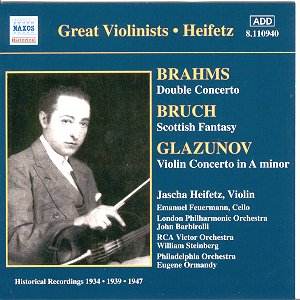Jascha Heifetz (1901-87)
Alexander GLAZUNOV (1865-1936)
Violin Concerto in A Minor Op 82 (1903)
with John Barbirolli, LPO (rec. 28/3/34, EMI Abbey Road Studio No.
1)
Max BRUCH (1838-1920)
Scottish Fantasy, Op 46 (1879-80)
with William Steinberg, RCA SO (rec. 12/9/47, RCA Victor Studios,
Hollywood)
Johannes BRAHMS (1833-1897)
Double Concerto in A Minor Op 102
with Emmanuel Feuermann, Eugene Ormandy, Philadelphia (rec. 21/12/39, Academy
of Music,
Philadelphia)
 Naxos 8.110940
[74.58]
Naxos 8.110940
[74.58]
Crotchet
Amazon UK
Amazon
US

For a start this is Naxos: so if you've not got these Heifetz recordings,
or one of these works, then buy it ... unless Dutton re-master all these
performances, which is unlikely.
Just to prove he was still on top in the Glazunov, Heifetz in 1957 managed
to knock 36 seconds off his first movement's earlier self, 18 off the next
movement, 35 off the third and only slows down to six seconds longer in the
last, probably taken up with stereo echo. There's always been a tendency
to prefer the younger violinist, and an argument (that note-writer Tully
Potter recalls elsewhere in the Prokofiev/Gruenberg coupling) that Heifetz's
violin tone, like many others, was more flattered by the fierce film noir
mono; rather like singers' voices sounding better in acoustic recordings.
In truth, playing both performances, I was struck by consistency. There is
a close-miked fullness in the stereo version, but this merely means the mono
sound has toned down the almost equally close effect; and lent it a quick-silvery
tone. And perhaps Hendl isn't quite as sensitive (more filmic in fact) an
accompanist as Barbirolli, but this had more to do with sonic production
and might be an unfair judgement. Certainly the orchestral sound is remarkably
fine. This 1934 recording was, with the Mozart 5th ('Turkish'), the first
concerto Heifetz recorded. He was to have alternated his English sessions
with a two-pronged assault on the concerto, recording the Sibelius with
Stokowski; but a clash of wills caused Heifetz to veto its issue. So till
1937 he recorded concertos solely in England. In recording the Glazunov he
stole a march on Nathan Milstein, then more closely associated with it. It's
wonderfully full playing, with the high-wire finale suddenly taking the concerto
to a level the opening hinted at. Either recording is desirable, but RCA
have tarried too long with their niggardly mid-price. So for the present,
should couplings suit, the choice is clear.
The Bruch is another work Heifetz recorded again, with Sargent and the New
Sinfonia of London in the late 1950s, with the same panache and with all
the pianissimo still beautifully caught. This comes coupled with the First
Concerto Op 26, and is a logical choice. The fill-up is the Vieuxtemps 5,
whose earlier performance Naxos have brought coupled with the Fourth elsewhere.
Again in the earlier performance, Heifetz and the underrated Steinberg and
house orchestra are caught with mono fullness. There is also a skimming of
hiss we expect from Dutton above all, from EMI, and to a slightly lesser
extent, from this Naxos. Dutton have announced the same Bruch recording,
with equally disparate couplings.
Much of Potter's notes focus, understandably, on the performers and their
relations to the work. Sometimes one would have liked a fuller commentary
on the latter, but these aren't really intended for the first-time buyer,
but for the duplicating die-hard.
The Brahms Double Concerto with Feuermann is still the most famous recorded.
Thus the famous displacement of the Thibaud/Cortot recording by this already
war-darkened, December 21st 1939 performance with Ormandy comes up against
the Biddulph remastering. That's logically paired with the Heifetz Brahms
Violin Concerto, from 11th April the same year. Naturally one might expect
it to come with the at best semi-hiss-skimmed approach Biddulph often prefer.
Pearl of course prefer the full cream hiss, allowing a bloom that reduction
can deaden. But here's the surprise. For their 1991 remastering, Biddulph
employed Mark Obert-Thorn and Ward Marston, both now famous and both working
with Naxos.. It's the former who remasters this production. There's very
little background hiss, or bloom, in either. Repeated playing of the opening
convinced me of little save that the opening ambient half-second had been
clipped in the Biddulph. Need one say more? Oh, the performance... It's still
the finest; the pairing is magical, Feuermann (about whom Potter writes so
eloquently and, rightly, at length) was the one soloist to stand up against
Heifetz. Which is why their collaborations, sometimes with William Primrose,
were Heifetz's, and in many respects the world's, finest of their kind.
Simon Jenner
Listed Comparisons
Glazunov - Heifetz, RCA Symphony Orchestra, Walter Hendl (1957) RCD1-7019
Brahms - Biddulph remastering, 1991 LAB 041

